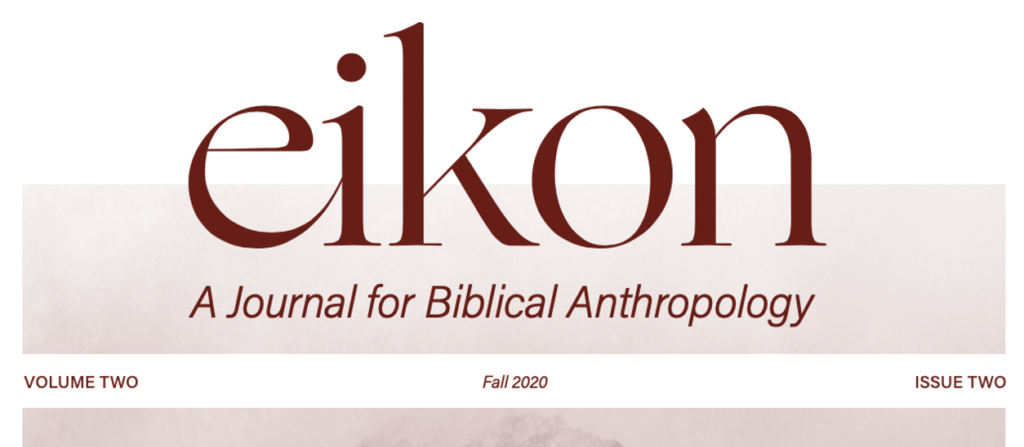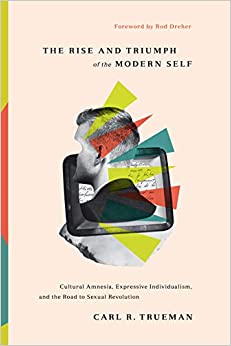Editor’s Note: The following book review appears in the Fall 2020 issue of Eikon.

Carl R. Trueman. The Rise and Triumph of the Modern Self: Cultural Amnesia, Expressive Individualism, and the Road to Sexual Revolution. Wheaton, IL: Crossway, 2020.
 “Born this way.” “Love is love.” “Equality is not a sin.”
“Born this way.” “Love is love.” “Equality is not a sin.”
The LGBTQ+ vanguard of the sexual revolution has an aura of normalcy and inevitability. Who could object to love? And who wants to be found on the wrong side of history? This aura of normalcy and inevitability is a powerful cultural force — one could even say weapon.
For those who want to resist this revolution, the question is how. Carl Trueman’s outstanding new book, The Rise and Triumph of the Modern Self, offers one essential piece of the answer. Postmodern deconstructionists learned from Nietzsche to undermine dominant moral paradigms by unveiling their genealogy: showing where they came from and whose interests they serve. In this thorough, measured, perceptive, and crisply-written work of intellectual history, Trueman offers a genealogy of his own.
In essence, this book is a genealogy of a single sentence: “I am a woman trapped in a man’s body.” Even a couple generations ago, such a statement would have been widely regarded as nonsense. “And yet today it is a sentence that many in our society regard as not only meaningful but so significant that to deny it or question it in some way is to reveal oneself as stupid, immoral, or subject to yet another irrational phobia” (19). In order for this statement to become widely plausible, a series of key shifts had to take place in popular beliefs regarding the relation of mind to body and gender to sex, as well as in applying notions of civil rights and individual liberty to newly conceived identities and orientations. Trueman’s book tells the story of those shifts.
The two chapters of Part 1 set out basic concepts that Trueman uses in his historical narrative. These are drawn principally from Philip Rieff, Charles Taylor, and Alasdair MacIntyre. Trueman compares and coordinates Rieff’s description of modern “psychological man” with Taylor’s analysis of the “expressive individualism” that defines our modern “social imaginary.” In both conceptions, the key to a meaningful life is discovering one’s authentic self within and enacting that inner self’s desires despite external opposition from tradition, authority, or religion.
Another especially important category that Trueman critically deploys is Rieff’s concept of a “third-world” culture. This refers not to economic development, but to broad historical shifts from societies whose morality was justified by appeals to the gods and fate (first world, as in ancient Greece), to faith in God’s objective revelation (second world, as in medieval Christendom), to a purely immanent moral order, one not grounded in anything transcendent (third world: the modern West). From fate to faith to feeling: in our social imaginary, feeling is final. To skip to Trueman’s conclusion: “The long-term implications of this revolution are significant, for no culture or society that has had to justify itself by itself has ever maintained itself for any length of time” (381).
Parts 2 and 3 tell the historical story of how this social imaginary took shape. As Trueman pithily summarizes the narrative in a few places, first the self was psychologized, then psychology was sexualized, then sex was politicized. Key figures in the first step include Enlightenment and Romantic intellectuals and poets, such as Jean-Jacques Rousseau and Percy Bysshe Shelley, who fostered a cult of authenticity and viewed monogamy as a repressive shackle. Key to the second step, the sexualizing of psychology, was Sigmund Freud, the founder of psychoanalysis. And key to the politicization of sex is the trajectory from Marx through the critical theory of the New Left, which treats sex as a “constitutive element of public, social identity” (239) and seeks to liberate society from the tyranny of traditional sexual mores and their nursery, the family.
Part 4 narrates three triumphs of the sexual revolution: the triumphs of the erotic, the therapeutic, and “the T,” transgenderism. In these chapters Trueman sticks the landing. Each chapter compellingly shows how the trends traced earlier have come to define life in the modern west, from the ubiquity of pornography to the “mystical approach” to personhood enshrined in the 1992 Supreme Court decision in Planned Parenthood v. Casey. The book concludes by glancing at possible futures and gesturing toward how Christians can best respond to this brave new world of plastic identity. And this rather full summary barely scratches the surface.
The only criticism of the book I am tempted to offer, but will not, is that its strict focus on intellectual history could obscure the indispensable role of material circumstances, especially exponential advances in technology, in fostering the fictions that to be human is to be self-made, and that one’s sex is included in the scope of that self-making. The reason I do not offer this criticism is that Trueman acknowledges the crucial role of technology in enabling these shifts (38–39), and grants that his narrative needs to be supplemented by one about “how the liquidity of our age intensifies this plasticity—the transient, temporary, and ephemeral nature of the institutions and the technology that shapes our identity” (384).
Perhaps the highest compliment I can pay the book is this: during the two weeks in which I read it, there were four or five times when, in the course of fairly routine teaching and counseling and conversations with church members, insights from the book sharpened my perception and enabled me to offer a better answer than I otherwise would have. Why has victimhood been weaponized, such that free speech is now more a problem than solution? Because harm and oppression are now regarded as primarily psychological categories (55, 63). Why does it seem that every issue in our society has been politicized? Because “once one side in the political debate chooses to politicize an issue, then all sides have to play that game” (334–35). Trueman’s book explains the intellectual, cultural, and political waters we all swim and fish and bathe in.
More than that, The Rise and Triumph of the Modern Self explains how the water got to be this way. That our cultural waters are so contaminated by plastic notions of sex and identity is neither normal nor inevitable. And recognizing the sheer contingency of so much that the sexual revolution wants us to take for granted is one crucial step for resistance.
Bobby Jamieson (PhD, University of Cambridge) is an associate pastor of Capitol Hill Baptist Church in Washington, DC. He is the author, most recently, of The Paradox of Sonship: Christology in the Epistle to the Hebrews (IVP Academic, forthcoming).
You, too, can help support the ministry of CBMW. We are a non-profit organization that is fully-funded by individual gifts and ministry partnerships. Your contribution will go directly toward the production of more gospel-centered, church-equipping resources.